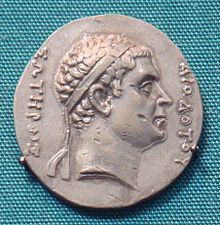Diodotus I
| Diodotus I the Saviour | |
|---|---|
| Greco-Bactrian king | |

"Pedigree" coin of Agathocles, with the effigy of Diodotus, the Greek inscription reads: ΔΙΟΔΟΤΟΥ ΣΩΤΗΡΟΣ - "(of) Diodotus the Saviour".
|
|
| Reign | c. 255 BC – c. 239 BC |
Diodotus I Soter (Greek: Διόδοτος Α' ὁ Σωτήρ; epithet means "the Saviour"; c. 285 BC – c. 239 BC) was Seleucid satrap of Bactria, rebelled against Seleucid rule soon after the death of Antiochus II in c. 255 or 246 BC, and wrested independence for his territory. He died in 239 BC.
This event is recorded by Trogus, Prol. 41; Justin xli. 4, 5, where he is called Theodotus; Strabo xi. 515. The name apparently is related to the title Soter he uses for himself. His power seems to have extended over the neighbouring provinces. Diodotus was a contemporary, a neighbour, and probably an ally of Andragoras, the satrap of Parthia, who at about the same time also proclaimed independence from the Seleucid Empire.
Diodotus wrested independence for his territory after the death of the Seleucid ruler Antiochus II Theos, who had been embroiled in a war against Ptolemaic Egypt:
Diodotus, the governor of the thousand cities of Bactria (Latin: "Theodotus, mille urbium Bactrianarum praefectus"), defected and proclaimed himself king; all the other people of the Orient followed his example and seceded from the Macedonians. (Justin, XLI,4 )
The new kingdom, highly urbanized and considered as one of the richest of the Orient (opulentissimum illud mille urbium Bactrianum imperium "The extremely prosperous empire of the thousand cities of Bactria" Justin, XLI,1 ), was to further grow in power and engage into territorial expansion to the east and the west:
The Greeks who caused Bactria to revolt grew so powerful on account of the fertility of the country that they became masters, not only of Ariana, but also of India, as Apollodorus of Artemita says: and more tribes were subdued by them than by Alexander... Their cities were Bactra (also called Zariaspa, through which flows a river bearing the same name and emptying into the Oxus), and Darapsa, and several others. Among these was Eucratidia, which was named after its ruler. (Strabo, XI.XI.I )
...
Wikipedia
